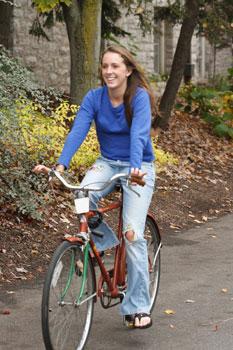Dickinson College
Greener Than Green

Transportation is uber-sustainable with new biking program
by MaryAlice Bitts-Jackson
Ecological transportation just got a little greener with the launch of Dickinson's Green Bikes program. The new bikes, which are constructed by Dickinsonians on site, provide convenient transportation that's uber-sustainable and in high demand.
Tractor-inspired symbolism
The initiative began with a bicycle frame that had been abandoned on campus and placed in storage for more than a year. No one had come to claim it, so the Department of Public Safety donated it to the Handlebar, a bicycle cooperative that had been developed in spring 2011 by the Center for Sustainability Education (CSE) with support from the Dickinson Idea Fund.
That put the frame in the capable hands of Handlebar advisor Glen Peterman, director of sponsored projects and research compliance, who has been a Schwinn-factory-certified bike mechanic since taking a job at a bicycle dealership when he was in high school. The frame had been slathered with more than five coats of paint over the years, so Peterman took it to a farmer west of Carlisle who sandblasts and paints tractors.
"When he asked me to pick a color, I took one look at his tractor and said, 'How about John Deere green?' " Peterman recalls.
That serendipitous choice would prove symbolic, as student volunteers and Handlebar advisors—Peterman; local bicycle enthusiast Ross Willard; GIS Specialist Jim Ciarrocca; Public Safety Lieutenant Joe Fazio; Director of Institutional Research Mike Johnson; and former Dickinson archivist George Hing—built a fleet of 10 refurbished bicycles from donated parts. Like the bicycle that sparked the project, the bikes were both figuratively—and, in part, literally—green.
When they were unveiled during the 2012 Orientation, the bikes were snapped up immediately, and a waiting list for 25 more was created. Anthropology major and CSE Biking @ Dickinson Intern Avery McGuire '13, who spearheaded the Handlebar project in early 2011 and is student manager of the Green Bikes project, says that the Handlebar plans to at least double the fleet by next spring to meet the demand. "Everyone seems extremely excited about it," she says.
Red or green? (It depends.)
According to Lindsey Lyons, CSE assistant director, that enthusiasm reflects an interest on campus that has grown steadily since the launch of the Red Bikes program in 2007. Last fall, students checked out Red Bikes more than 800 times, and the number of students who bring their own bicycles to campus also has increased in recent years. The college has purchased eight additional bike racks, since many of the campus' new racks are already full.
"People are starting to consider biking as a really good option, and that's a visible sign of the college's sustainability initiatives moving forward," Lyons says, explaining that when students cut down on driving by increasing bicycle use, they reduce greenhouse emissions.
But while the Red Bikes program provides an environmentally sound way for occasional riders and campus visitors to gad about campus and town, it doesn't meet the needs of frequent cyclists. Because the red bikes are rented out on a daily basis, some bicyclists had to check out bikes as often as 20 times each semester last year.
Some of those students had become cycling fans while on campus. Others were longtime enthusiasts who lived in pockets of the globe where bicycling is widespread. "There are a lot of international students and students from across the country who are used to bicycling on a regular basis at home," Peterman explains, "but they couldn't bring their bikes with them, because you can't very easily pack a bicycle in a suitcase and pack it onto a plane."
The green bikes, which sport green forks—the part of the bike that holds the front wheel—meet the needs of such students, because they are rented out for a semester at a time. Handlebar volunteers are on hand throughout the semester to provide tune-ups in their on-campus shop. (Most replacement parts are free; bicyclists buy only the parts that must be new, such as tires, brake pads or tubes.)
Everyone wins
Campus bicyclists are not the only ones who gain from the program. Because the bicycles are constructed at Dickinson out of repurposed parts, their carbon footprints are extraordinarily low, adding an extra layer of environmental sustainability to an already responsible choice.
The program also gives Handlebar volunteers a chance to partner with community leaders such as Willard, whose Harrisburg bicycle-salvage warehouse, Recycle Bicycle, supplies bicycles for needy families and individuals. Handlebar volunteers regularly visit the warehouse to pick up gently used parts and pitch in with repairs, and Willard and his fellow advisors share their knowledge of bicycle education with the crew.
"What that means is that while the green bikes support sustainability initiatives, they also touch on many other major college campus initiatives, such as service, useful skill-building, peer education, community-building and networking," Lyons says. "That's why it's attracting a lot of interest across campus." Attendance at a recent Handlebar open house, which brought in 110 visitors, supports this view.
So for all of the benefits to bicyclists and the environment they inhabit, Peterman believes that it is the Handlebar volunteers who gain the most from the program. "There's an intense drive among the students to acquire the skills for self-sufficiency—and there's a lot of good work being done," he says.
Published October 31, 2012